10 Best Enterprise Contract Management System
An enterprise contract management system that enables organizations to manage contracts from drafting to renewals through a single, centralized dashboard, ensuring better visibility, control, and efficiency.

Overview
The contract lifecycle management process is well structured and assists businesses to enhance the relationship with the vendors as well as minimizing manual effort and workload.
A study by Grand View Research indicates that the world market of contract management software is estimated to be approximately USD 2.83 billion in 2024 and is projected to increase steadily at a robust rate in the coming years.
This expansion underscores the significance of best enterprise contract management to contemporary businesses.
Importance of Enterprise Contract Management System
Enterprise contract management system assists organizations to effectively handle increasing contract volume and regulatory requirements. That is why it can enhance your legal workflow.
- Centralized Management
Contracts in large organizations are developed, stored and accessed by numerous teams throughout extended durations. When the agreements are stored in a centralized repository it is easier to comprehend what contracts are, who owns what, and how they are connected to business processes. This common structure helps in the consistency of the way contracts are managed within the departments. - Compliance
Regulatory and compliance rules are becoming harder to manage at scale. Research by PwC shows that 85% of organizations believe compliance requirements have become more complex. An enterprise contract management system plays an important role by helping organizations keep contract obligations, policies, and legal terms visible and organized as regulations evolve. - Faster Approvals
Contracts can pass through legal, finance, procurement, and leadership departments. In cases where approvals require email trails or tools that are not connected, the decision timelines may become lengthy. A enterprise contract management system offers smooth contract approval process, which assists organizations to manage growth without slackening internal decision-making. - Contract Visibility
The more the contracts one has, the more difficult it is to determine what has been signed, what is in operation, and what is approaching change points. Transparency on the visibility of contracts, terms and timelines enable leaders and teams to be aware without manual follow-ups or personal tracking systems. - Cost Control
Contracts have a direct influence on expenditure, renewal, punishment, and price undertakings. Organizations can lose financial details embedded in agreements without a systematic method of reviewing and monitoring them. The centralized contract system assists the decision-makers to analyse the contractual costs against the budgets and long-term plans. - Audit Readiness
Usually contract audit are conducted with the need to access signed contracts, previous versions, and approval records in a short period of time. In cases where the contracts are spread out in folders or personal drives, it will take more time to prepare the reviews. A good system assists organizations to keep records that can be consulted at the time of need. - Business Scalability
The volume of contracts increases with complexity as businesses move to new locations, products or alliances. This growth is hard to manage manually with time. A contract management system ensures growth by offering a uniform method of managing contracts without altering the fundamental operations.
10 Best Enterprise Contract Management System
We have already seen the importance of an enterprise contract management system to businesses and here is a glimpse of some of the best enterprise contract lifecycle management system in the market.
Products | Integrations | Trial Period |
CLM 365 | MS Teams, Outlook, SharePoint, Power BI, MS Word Plugin | 14 days (No credit card details required) |
ContractWorks | Salesforce, Pipedrive and okta | 14 days |
Icertis | SAP, Salesforce and Workday | 14 days |
DocuSign CLM | Adobe Acrobat, SAP Ariba and Salesforce | 30 days |
Cobblestone | Salesforce, ERP systems and NetSuite | 30 days |
Summize | Google Drive, Salesforce, Slack and Gmail | Guided Trial Setup |
Agiloft | Adobe Acrobat Sign and MS Outlook | 14 days free trial |
Juro | Pipedrive, Ashby, Slack and Google Drive | Guided Trial Setup |
GateKeeper | Salesforce, NetSuite, Airtable and Asana | Guided Trial Setup |
DocJuris | Zapier, Google Driver and Stack | Guided Trial Setup |
1. CLM 365
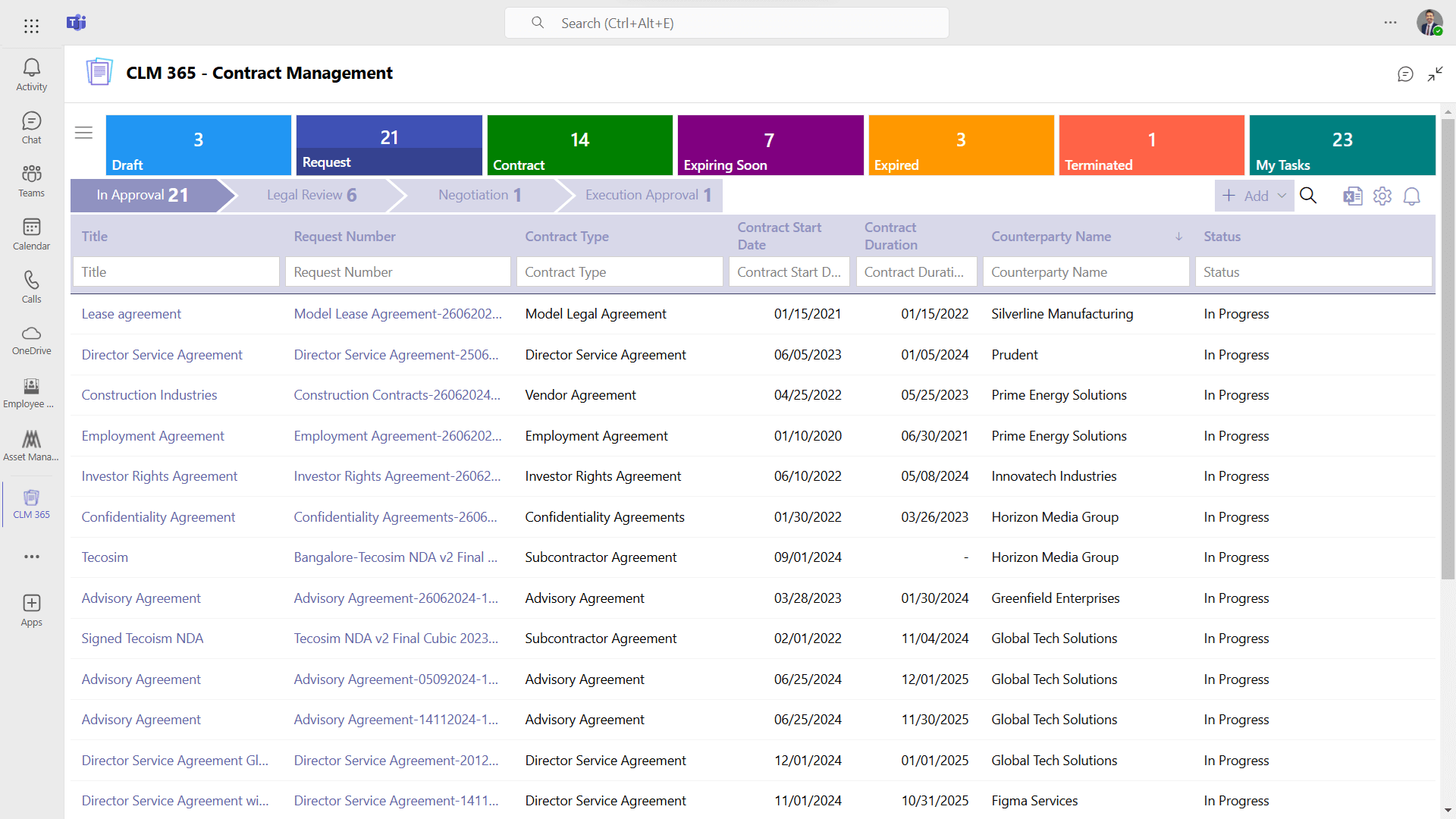
CLM 365 is an effective enterprise contract management system that is aimed at organizations that operate in the Microsoft ecosystem extensively. The platform is created to assist legal, procurement, and business teams and provides a systematic approach to the management of contracts through their creation to closure without violating internal policies. Its strong integration with Microsoft 365 makes it a good tool to use in enterprises that do not want to leave the business tools they are used to.
Key Features
- AI contract summary
- Automated workflows
- Central contract repository
- Draft comparison
- Contract templates library
- Role based security
- Multilevel approvals
- Digital signature
- Version Control
- Contract amendment
- Audit Logs
- Reports and analytics
- Renewals
Key Benefits
- Saves legal workflow time by summarizing the contract clauses with the help of AI.
- Helps teams are kept on track with accepted language and company policies.
- Gives explicit supervision over contracts and obligations.
- Reduces the reliance on emails and shared drives to handle contracts.
- Supports business development using formal contracting.
CLM 365 Ratings
G2: 4.8
Capterra: 4.8
Microsoft AppSource: 4.9 (79 reviews)
Our Pricing: CLM 365 helps companies to handle contracts within the organization with flexible plans to accommodate various team requirements. The pricing begins at 29.99 per user / month and is billed on an annual basis and supports the entire contract life cycle.
How to Deploy CLM 365
There is no complex integration of CLM 365 with your current business processes. Here’s how to get started.
- Analyse your existing contract lifecycle to find out the bottlenecks or difficulties in approvals, drafting and storage.
- Conduct a list of all the tools in use today in contracts to know where CLM 365 fits.
- Activate CLM 365 and integrate it with Microsoft 365 to have combined capabilities.
- Connect it with Outlook, Teams, SharePoint, MS Copilot, and the Word plug-in to handle contracts in applications you know.
- Set up approval processes, role-based access, and notifications of significant dates of contracts.
- Give them practical training and easy guides to help the team to learn the new system fast.
- Monitor performance, assess the efficiency progress, and modify work processes accordingly.
Tip: The AI agent in CLM 365 can analyse contracts automatically, identify key clauses, obligations and possible risks, which saves time and minimizes the need to review contracts manually.
2. ContractWorks

ContractWorks is a business contract management platform that emphasizes on simplicity, security and quick adoption. It is popular among legal departments that do not desire to install a heavy set up to store, search and track contracts. The platform is also appropriate to the organizations that appreciate prompt access to contract information and high document security.
Key Features
- Secure contract storage
- Advanced contract search
- OCR text recognition
- Role-based access
- Contract reminders alerts
- Permission management controls
- Audit activity logs
- Bulk document upload
Benefits
- Makes contracts readily available in large portfolios
- Saves time wastage on document search
- Access is handled by the Helps legal teams
- Enhances deadline and renewal management
- Helps to enforce compliance with clear access records
Ratings
G2: 4.6
Capterra: 4.7
3. Icertis
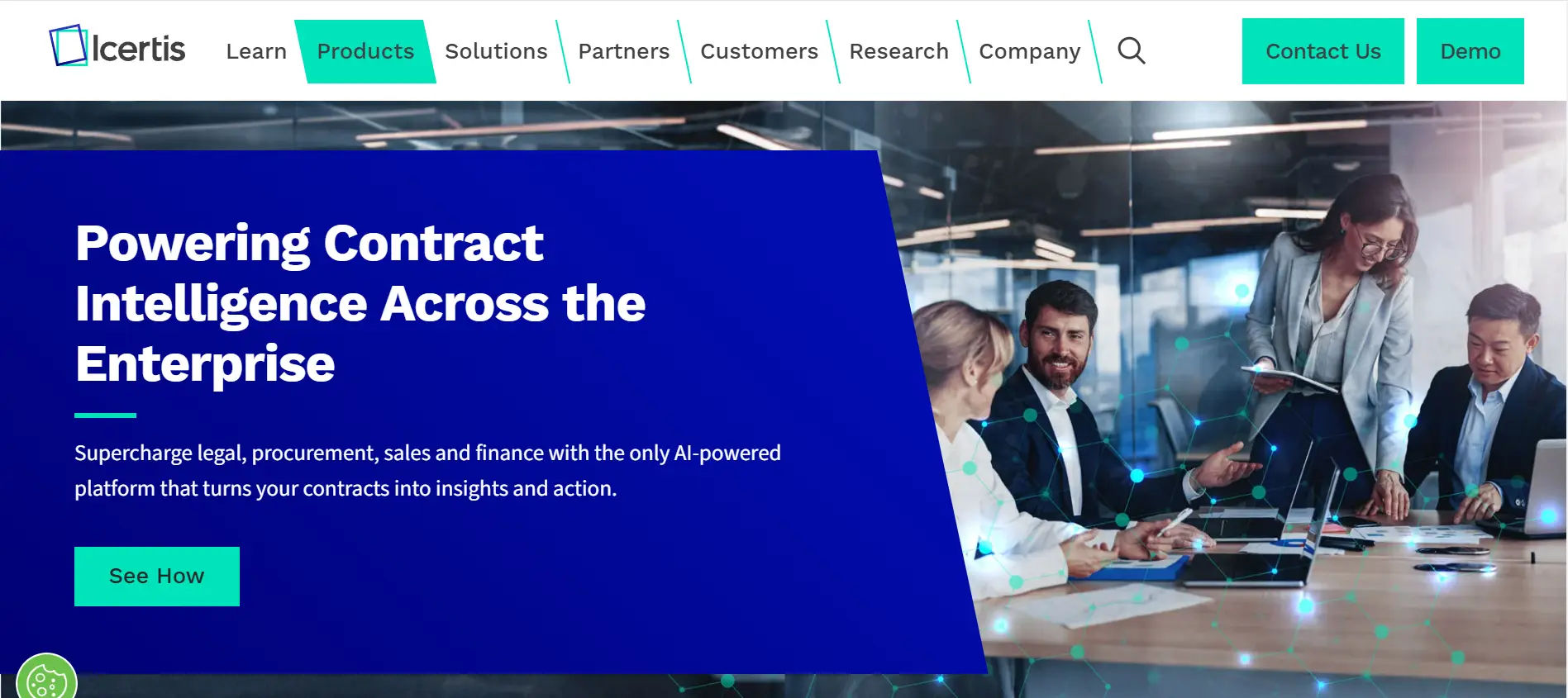
Icertis is a commercial enterprise contract management system designed to support large and international organizations. It is known to manage complex contracts at large scale and assists legal, sales, and procurement functions with good governance capabilities. Enterprises with high contract volumes in different regions tend to use the platform.
Key Features
- Automated contract workflow
- Advanced obligation tracking
- AI contract intelligence
- Configurable workflows engine
- Global compliance support
- Clause performance insights
- ERP system integrations
- Contract portfolio analytics
- Lifecycle rules management
Benefits
- Supports intricate enterprise contract designs
- Assists in dealing with regulatory requirements in regions
- Enhances contract risk and contract terms visibility
- Aligns contracts to enterprise policies
- Scales well with big contract volumes
Ratings
G2: 4.2
Capterra: 4.3
4. DocuSign CLM
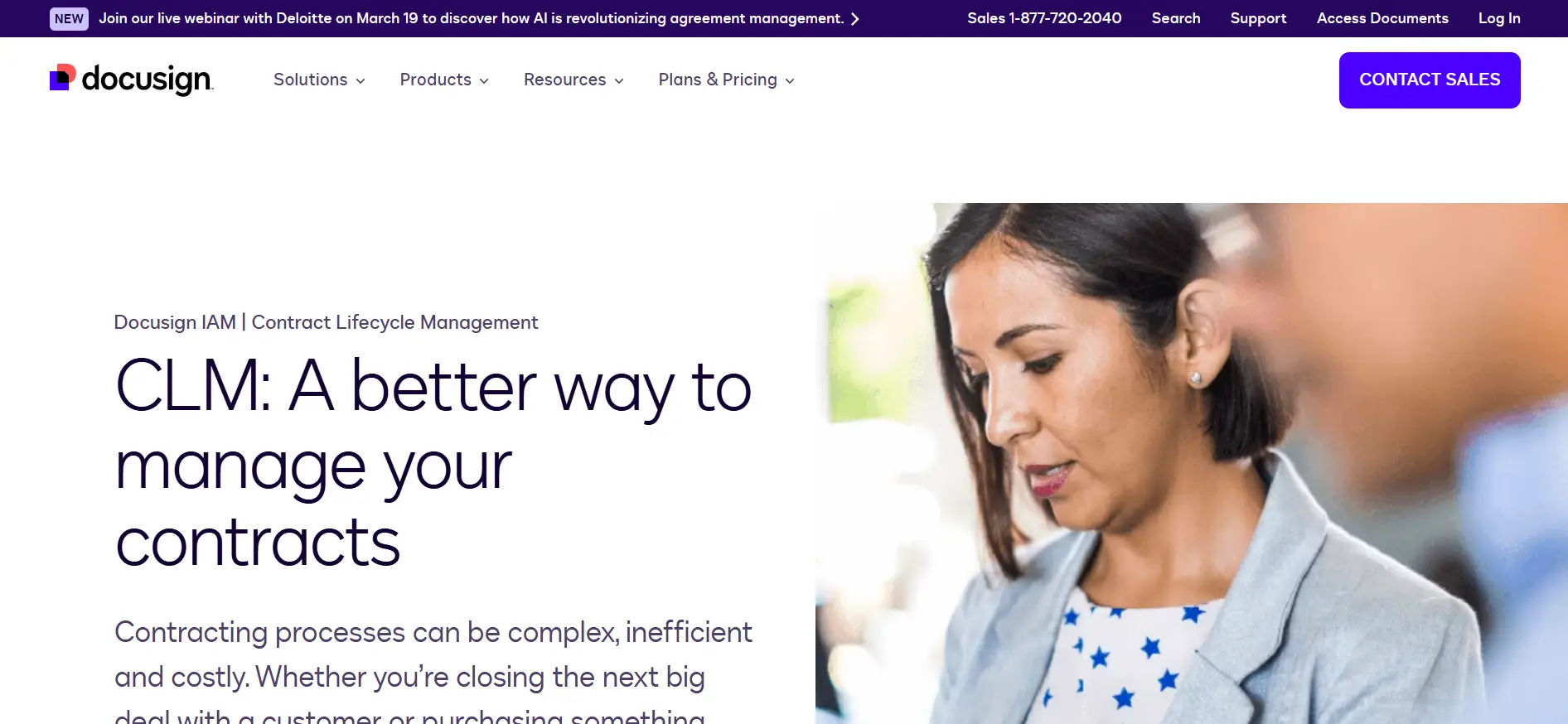
DocuSign CLM is a commercial contract management system designed to be more than electronic signatures and full lifecycle management of contracts. Organizations that already use DocuSign and desire to track contracts, approvals, and store them within a single environment are the common users of this.
Key Features
- Contract creation tools
- Approval workflow logic
- Clause library
- Redlining option
- Secure digital signing
- Version control tracking
- Contract repository access
- Renewal monitoring alerts
- Data field mapping
Key Benefits
- Connects to various departmental requirements
- Helps handle compliance on a large scale
- Helps contract stakeholder coordination
- Supports the detailed contract reporting requirements
- Manages increasing contract volumes
Ratings
G2: 4.3
Capterra: 4.7
5. CobbleStone
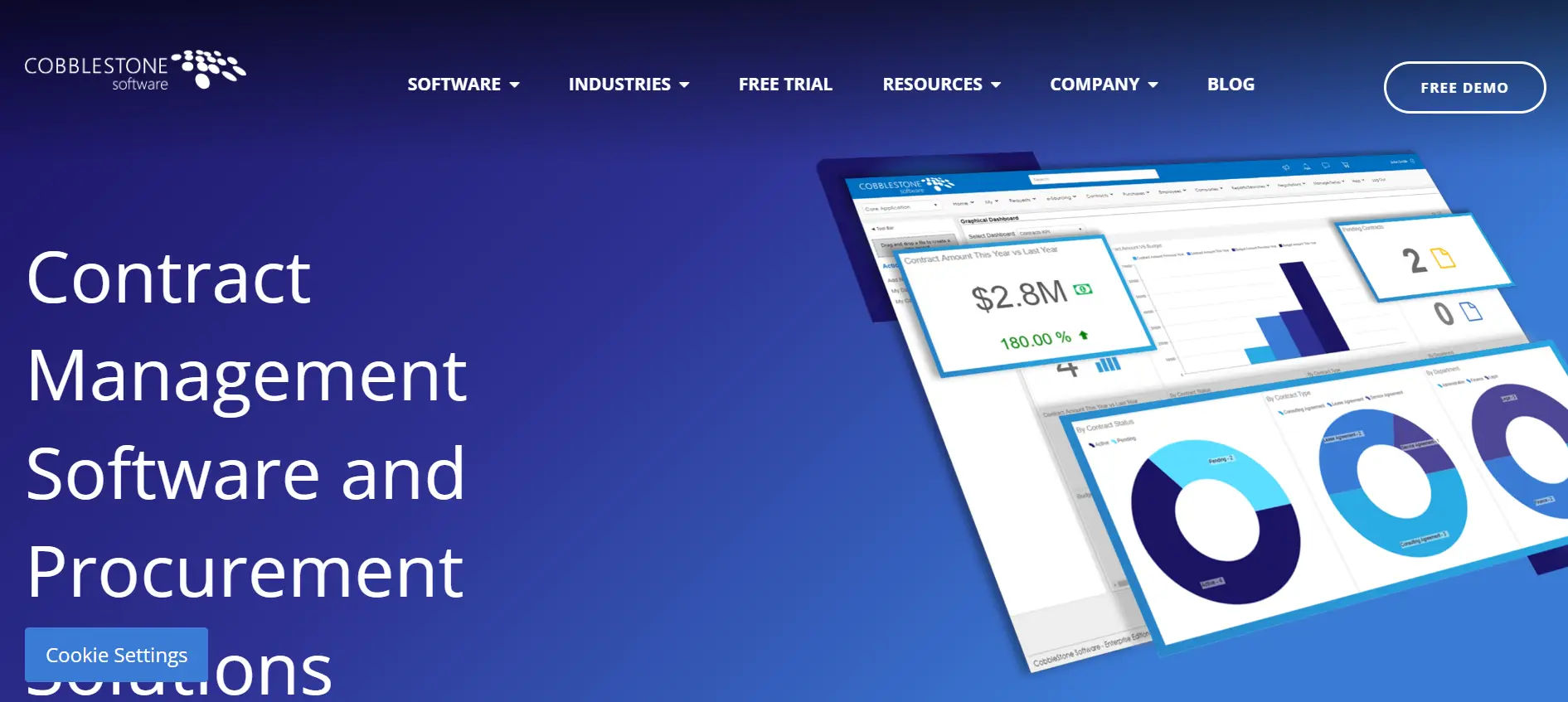
Key Features
- Configurable workflow builder
- Centralized contract database
- Compliance tracking tools
- Approval routing setup
- Custom reporting dashboards
- User permission controls
- Contract version history
Benefits
- Adapts to different departmental needs
- Helps manage compliance requirements at scale
- Improves coordination between contract stakeholders
- Supports detailed contract reporting needs
- Handles growing contract volumes effectively
Ratings
G2: 4.8
Capterra: 4.7
6. Summize
Summize is a best system to handle enterprise contracts that would be naturally integrated into business tools that are utilized by legal teams. It is oriented towards collaboration, visibility and policy alignment, and thus it is appropriate in organizations that desire contract process to be reviewed efficiently during the negotiation process.
Key Features
- Legal-led workflows
- Clause policy controls
- Approval tracking visibility
- Contract drafting tools
- Repository access management
- Rule-based automation
- Analytics reporting views
Benefits
- Helps law firms remain engaged during contracts
- Minimizes interdepartmental coordination
- Improves awareness of contract status
- Encourages the use of legal language that is approved
- Favors legal governance on an enterprise-wide basis
Ratings
G2: 4.7
Capterra: 4.8
7. Agiloft

Agiloft is a great system to manage agreements, particularly in an organization with complicated workflows and intricate business regulations. Enterprises that require more control over the flow of contracts between teams and approval levels commonly use it to assist legal and business users with the reviews, approvals, and contractual obligations in a more structured and organized manner.
Key Features
- No-code customization
- Workflow automation engine
- Advanced rule setup
- Contract lifecycle reporting
- Obligation management tracking
- Role-based permissions
- API system connectivity
- Audit trail records
Benefits
- Suits complicated business endorsement frameworks
- Favors elaborate contract management requirements
- Eliminates manual rule enforcement
- Helps law firms deal with responsibilities in a straightforward manner
- Scales with enterprise process requirements
Ratings
G2: 4.6
Capterra: 4.8
8. Juro
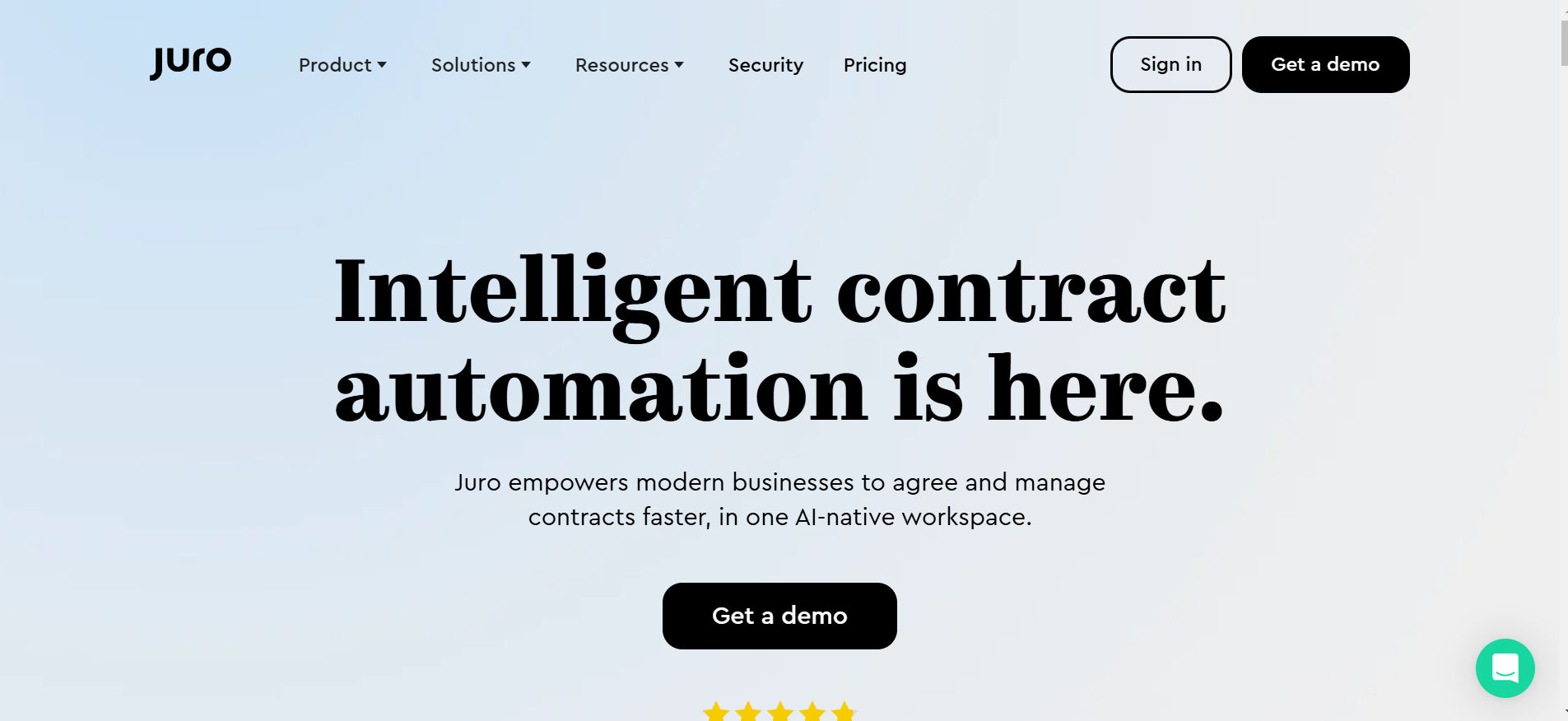
Juro is a trusted contract platform designed to support legal and business teams that move quickly. It integrates contract drafting, review and tracking into a single workspace and assists in-house legal departments to collaborate with sales and operations and keep contract work in order and visible.
Key Features
- Contract editor
- AI review option
- Live collaboration tools
- Template-based drafting
- Approval workflow setup
- Version control tracking
- Embedded signing support
- Contract metrics dashboard
- Searchable contract records
Benefits
- Enhances the cooperation of legal and business teams.
- Minimizes the use of document attachments.
- Helps teams monitor changes in the contract.
- Enhances transparency on contract development.
- Faster turnaround on contracts.
Ratings
G2: 4.6
Capterra: 4.8
9. Gatekeeper
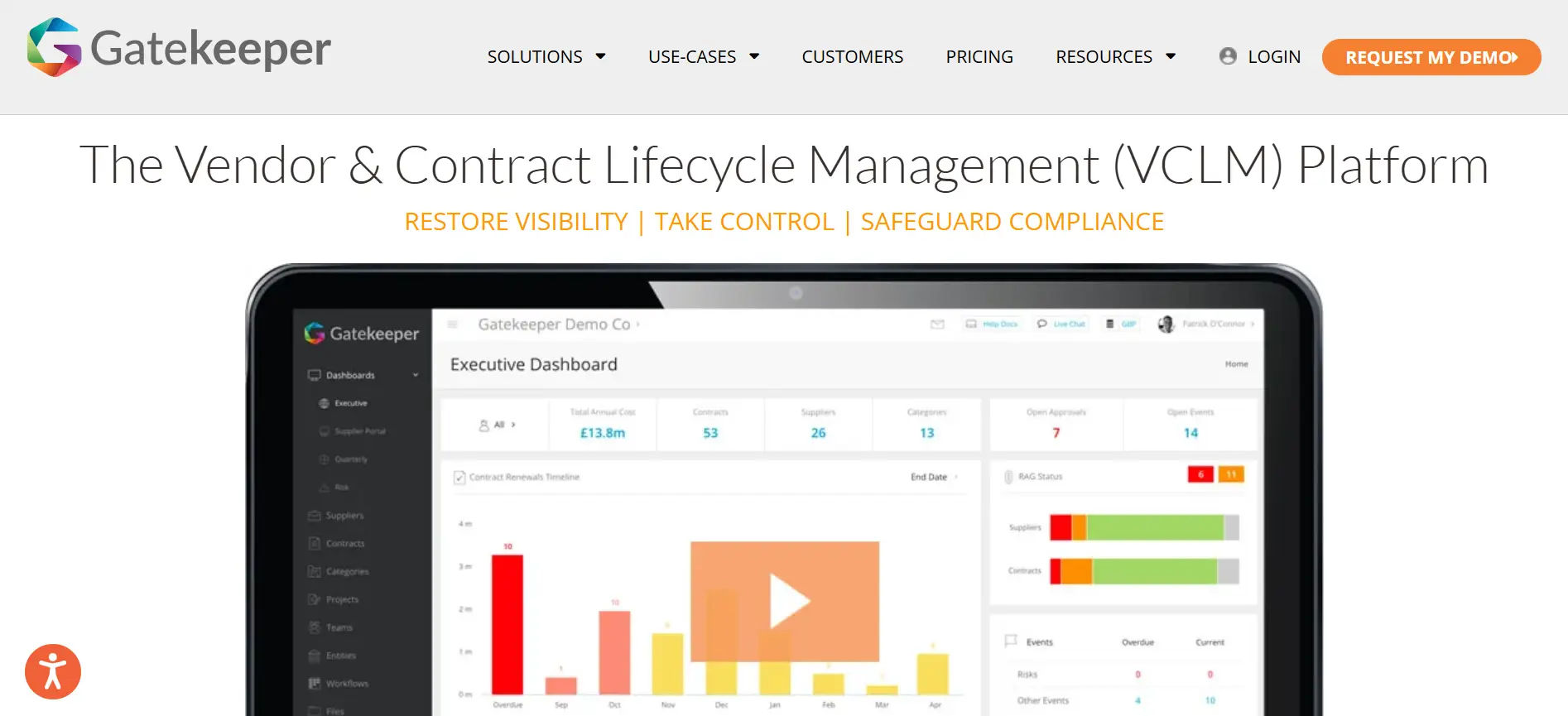
Gatekeeper is a powerful tool to handle agreements and is vendor and supplier contract oriented. Procurement and legal departments that handle existing supplier relationships, compliance documentation and commercial contracts commonly use it. It also assists teams to maintain clear records of contract terms, renewals and supplier obligations at a single place.
Key Features
- Vendor contract tracking
- Supplier relationship records
- Compliance obligation monitoring
- Automated reminders alerts
- Centralized document storage
- Approval workflow controls
- Reporting analytics tools
- Risk scoring insights
Benefits
- Helps coordinate supplier deals on a regular basis
- Enhances vendor visibility
- Favors procurement contract management
- Minimizes missed renewal dates
- Enhances contract governance
Ratings
G2: 4.5
Capterra: 4.7
10. DocJuris
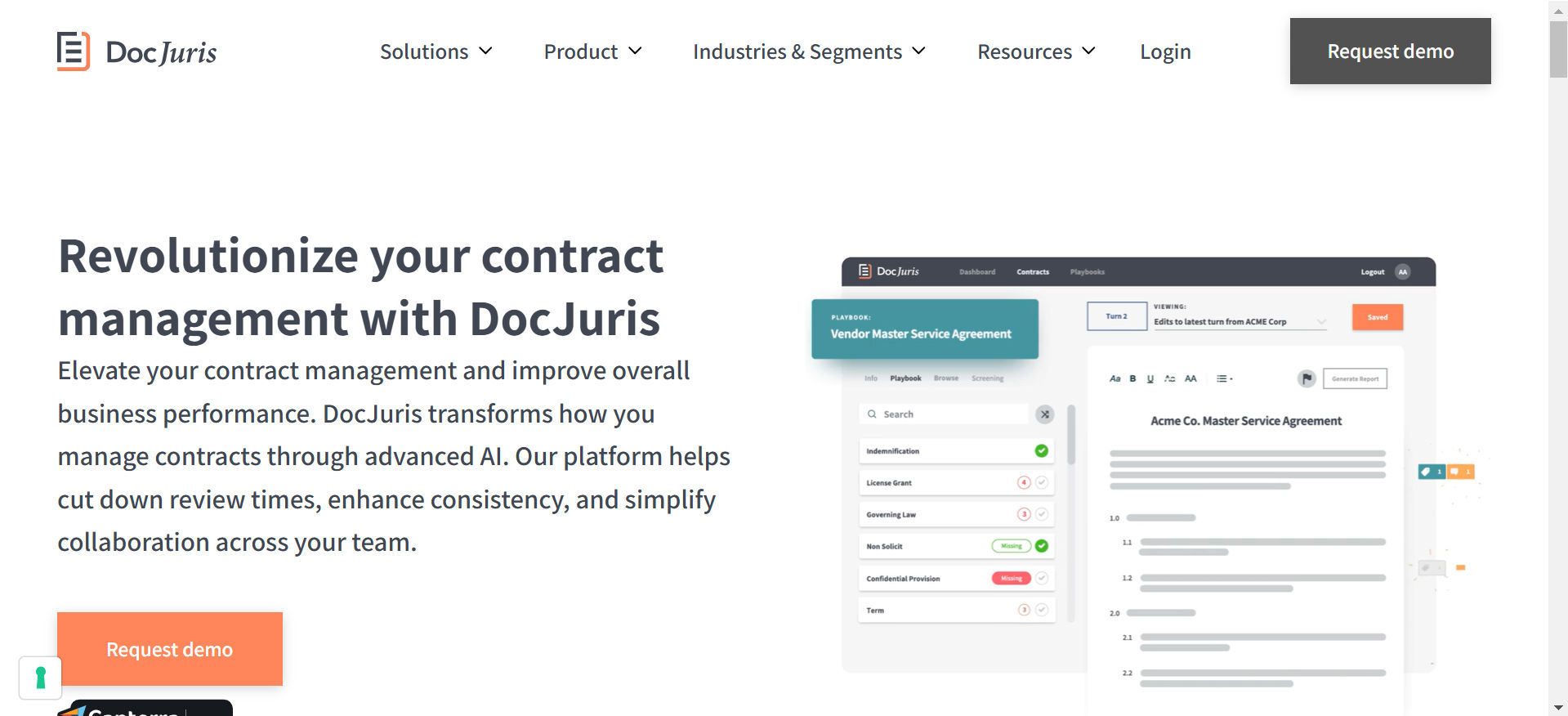
DocJuris is an ideal enterprise contract management system designed to assist in the review of contracts, negotiation, and control of policies. It is developed to meet the needs of legal teams seeking to have powerful control over contract clause and negotiation processes.
Key Features
- Legal playbook controls
- Clause risk scoring
- Redline comparison tools
- Policy compliance checks
- Contract review workflows
- Repository document access
- Negotiation insights panel
- Reporting visibility tools
Key Benefits
- Helps law firms deal with negotiation guidelines
- Enhances management of the use of contract language
- Minimizes time on deviations
- Supports a stable policy in law enforcement
- Provides insight into negotiation patterns
Ratings
G2: 4.5
Capterra: 4.8
Benefits of Using Enterprise Contract Management System
We have explored that when structured and flexible systems are used to support contract processes, enterprises are more valued. The following are the main ways an enterprise contract management system helps legal, procurement and business teams.
1. AI-Powered Workflow
The role of AI in the legal work is becoming increasingly prominent. A study by Thomson Reuters, Future of Professionals, indicates that 80% of the survey respondents in law firms believe that AI will completely transform the way they do business.
An AI-based enterprise contract management system assists the legal teams to summarize contracts, summarize the key terms and process repetitive work more quickly.
This will enable professionals to concentrate more on decision making as opposed to manual review
2. User Friendly Experience
Adoption matters in large organizations. A user-friendly enterprise contract management system makes it easier for both legal and non-legal teams to work with contracts.
When tools are simple to use, teams spend less time learning systems and more time completing contract tasks accurately and consistently.
This supports wider adoption across departments and reduces reliance on specialized users.
3. Data Security
Contracts often contain sensitive legal, commercial, and personal information. As compliance demands grow, protecting this data becomes more important.
An enterprise contract management system supports controlled access, structured record keeping, and better handling of compliance-related documents.
This helps organizations manage sensitive contract information responsibly as regulations continue to evolve.
4. Improved Contract Visibility
Visibility is becoming more critical as organizations are dealing with high volumes of agreements in teams and regions.
Enterprise contract management system enables teams to see the status of contracts, key obligations and important dates at a single location.
This common visibility enables legal, procurement and business teams to be on track, plan to renew contracts or modify and be more aware of contractual obligations throughout the organization.
5. Integration with Existing System
Businesses rely on numerous tools that are employed by finance, sales, procurement, and legal departments. A contract management system that is compatible with these tools enables the contract data to be linked to the broader business records.
This relationship facilitates a more effective coordination of teams, less data silos, and assists organizations to have a consistent contract information throughout business operations.
This supports better coordination between teams, reduces data silos, and keeps contract information consistent across business operations.
Recommended Reading: Best SharePoint Contract Management Software
6. Scalability
Growth of the business usually accompanies the rise of the volume of contracts, internal users, and approval levels.
A good system helps facilitate this growth as it will be able to manage bigger contract portfolios without interfering with the current processes.
The system is flexible to meet new requirements as organizations grow into new markets and collaborations without losing structure and control.
7. Improved Vendor Relationships
Enterprise contract management system assists the procurement and legal departments to maintain the supplier contracts in order, renewal schedule visible, and obligations documented.
This transparency assists organizations in better management of the vendors, long term partnerships and better working relationship in the long run.
It also helps teams approach vendor discussions with a clear understanding of existing agreements and expectations.
How Does Enterprise Contract Management System Improves Vendor Relationship
Here are key ways an enterprise contract management system can strengthen and improve vendor relationships.
- Clear Contract Records
An enterprise contract lifecycle management system stores all vendor contracts in a single, organized location. Teams can quickly access terms, pricing, service scope, and contract validity without searching through multiple files or emails. Having clear records reduces misunderstandings, supports collaborative contract management, and makes interactions with vendors more transparent and professional. - Timely Renewals Management
The importance of renewal dates and contract expirations is to ensure good relationship with the vendors. The dates are brought to the lead by a enterprise contract lifecycle management system and procurement and legal teams can prepare discussions early. - Defined Obligations Tracking
Vendor contracts usually contain delivery time, payment terms, service level and regulatory conditions. These obligations are easily tracked with an enterprise contract management system which assists teams in keeping track of compliance with agreed terms. - Better Internal Alignment
When all the contract information is used, collaboration between legal, procurement, and finance team is more effective. A contract management system allows access to correct data, which minimizes the gaps in the understanding and allows the teams to demonstrate a common, consistent stance in negotiations with the vendors. - Long-Term Vendor Planning
Keeping historical data of the contract, performance history, and history of amendments, enterprises can study the history of vendor relations. This knowledge leads to improved decision-making when renewing contracts, adjusting terms, and expanding partnerships, which eventually leads to improved, more strategic relationships with vendors.
Best Practices to Implement During Contract Workflow
After exploring the best contract management systems, it’s clear that following the right contract workflow practices helps make the process easier and more organized.
1. Define Clear Contract Roles
Clearly assigning responsibility will eliminate delays and enhance accountability. All the participants of the contract lifecycle are to be aware of their roles and decision-making authority.
- Assign owners for contract drafting, reviewing and approval
- Specify the person in charge of negotiations and amendments
- Share duties with the stakeholders
2. Standardize Contract Templates
The clause library eliminates errors and keeps the language of the contracts consistent. Standardization assists teams to save time and maintain professional and full agreements.
- Keep accepted templates of common types of contracts
- Include obligatory terms and important legal terms
- Keep update templates up-to-date with the changes in regulations
3. Track Key Dates and Milestones
Tracking of key dates such as renewals, expirations and deliverables keeps the contracts on track. This avoids delays in deadlines and facilitates enhanced interactions between vendors or clients.
- Important dates are recorded in a common calendar
- Create reminders of the deadlines and renewals
- Check milestone delivery on a regular basis with accountable teams
4. Maintain Detailed Audit Trails
Documenting all the activities in the contract process safeguards the organization and gives clarity. Audit trails are useful in monitoring approvals, modify contracts and communications.
- Document who reviewed, signed or amended contracts
- Keep the history of the save versions
- Maintain records of correspondence on changes of contract
5. Monitor Contract Compliance
Ensuring agreements helps to eliminate risk and enhance business relationships. Periodic compliance audits are used to detect issues before they escalate.
- Periodic review of contract obligations
- Monitor compliance to service levels and remuneration terms
- Deviations of flags and correct them
6. Encourage Cross-Team Communication
There are several teams that are usually involved in contracts like the legal, finance, and procurement teams. Open communication enhances better understanding and minimizes misunderstanding.
- Conduct periodic check-in on active contracts
- Post about approvals and renewals
- Facilitate the discussion of questions to clarify obligations or terms
7. Evaluate Contract Performance
Assessing contracts post-completion is useful in determining the lessons learnt and enhancing future contracts. Monitoring contract performance helps in improved decision making and enhanced partnerships.
- Review whether contractual obligations were met
- Analyse delays, risks, or challenges encountered
- Document insights for future contracts and improvements
Conclusion
The use of enterprise contract management system introduces transparency, control, and efficiency to the way organizations are managing agreements. Such systems are value-added in terms of legal, procurement, and business teams, including better vendor relations and obligation tracking, compliance and scalability.
In case your organization has several contracts or desires to have more insight into agreements, you can consider a more organized approach to contract management that can simplify the processes and make informed decisions.
Frequently Asked Questions
How does AI help summarize long enterprise contracts?
AI identifies the important clauses, obligations, risks, and commercial terms in long contracts and gives brief summaries to assist the stakeholders in faster reviewing of contracts.
How does the enterprise contract management system improve visibility into contract performance?
Dashboards and reports will give information on the status of contracts, renewal pipeline, compliance exposure, and financial commitments.
Does CLM 365 provide version control?
Yes, CLM 365 follows all the drafts and revisions of the contracts, providing users with the opportunity to compare the versions, restore the previous drafts, and have an efficient audit trail.
How does multi-level approval help legal teams?
Multi-level approval routes The contracts are taken through established levels of approval, which means that it is reviewed comprehensively, minimizes compliance risk, and is also efficient in tracking approvals.
Does CLM 365 allow customization?
Yes, CLM 365 lets you customize workflows, templates, approvals, and notifications to fit your organization’s processes and compliance needs.
Try It Free, No Obligation










Schedule a free personalized 1:1 demo
By proceeding, you accept Cubic Logics’s terms and conditions and privacy policy










Please provide your contact details, we will connect with you soon!
Please provide your contact details, we will connect with you soon!
Request for the custom price
By proceeding, you accept Cubic Logics Terms and Conditions and Privacy Policy
Schedule a free personalized 1:1 demo
By proceeding, you accept Cubic Logics’s terms and conditions and privacy policy








Request of the Free License
By proceeding, you accept Cubic Logics Terms and Conditions and Privacy Policy


